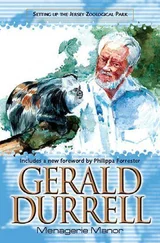Only a day or two after his arrival at Bakebe, for example, he had tried to shoot a red river hog, thinking it would make good eating (forgetting the £150 – some £3000 in today’s money – he could get for a live specimen back in England). On 7 January, his twenty-third birthday, he shot a black kite that had been stealing chickens, spectacularly blasting the bird out of the air with his shotgun in the middle of a juju dance in the village street, winning uproarious acclaim from the populace. ‘I was swept down the main street by the mob,’ he recorded, ‘surrounded by yelling and capering juju dancers. I presented the corpse to the chief, and there was much bowing and exchange of compliments. I felt like a scene out of a Tarzan film and departed secure in the knowledge that the White Man’s Prestige had been upheld.’
On Saturday, 10 January, the expedition prepared to set off for Mamfe at last. Its troubled procession north now turned from penance to pantomime, as Gerald reported:
The morning we moved from Bakebe to Mamfe was the funniest thing to date. The scene was indescribable. Our stuff was piled six feet high, boxes full of birds, rats, insects and frogs, and squatting about were Pious the steward, Fillup the cook, Emanuel, Daniel and Edward, the hunters, the carpenter and his wife and child, the hunter’s wife and child, the chief’s wife and the U.A.C. man’s three children, all hoping for a lift to Mamfe, plus about fifty relatives who had come to see them off. It was now twelve and the lorry should have been there at eight and by this time I was nearly mental. At last the lorry arrived, and thank God it was a large one – the driver had brought six relatives along for the joy ride. How we got everything on to the lorry I shall never know. There were about sixty people in a solid wedge around the back of the lorry, all shouting at once and endeavouring to climb on, the air full of whirling bundles full of sweet potatoes, yams and bananas. I was overwhelmed by a fighting horde of natives, my feet were trodden on, also my hand. When they had all piled on I remounted the lorry, and pointing to the crates of birds and animals explained that if one was dead or injured when we reached Mamfe they would all go before the D.O. After that they sat like mice, and must have been damn stiff when we reached Mamfe.
Mamfe was situated at the highest navigable point of the Cross River, on the edge of a vast swathe of uninhabited country – a pestilential place where malaria was rife and leprosy common. Gerald and John spent a little over a week there, often dining with the local DO, a helpful Englishman by the name of Robin, whose house was situated on a steep hill four hundred feet above the river. Gerald was profoundly enchanted by this spot, deep in the untamed heart of Africa, far, far from anywhere, and yet surrounded by all the comforts of privilege.
The house overlooks the place where two rivers meet. It forms a wide stretch of water like a lake. On each side is the jungle, and in the centre a dazzling white sandbar. Sitting on the terrace in the evening, you can see a herd of five hippo which live here, swimming about. Then, when it grows dark, you can hear them blowing and snorting and roaring below you. The two rivers flow through steep rocky gorges, and are spanned by so-called suspension bridges. The termites have had a wonderful time with these for the past twenty years, and the planks rattle and groan when you walk over them, a hundred and twenty feet above rocks and water. Down below you can see kingfishers and red and blue swallows nesting, and in the trees you can see monkeys in the evening.
There were few pleasures and interests to divert the scattering of European expatriates who lived in this land other than those which age-old Africa could provide. There were no hotels, no restaurants, no shops, no cinemas, no libraries, next to no electricity and – Gerald made a particular note of this – next to no white girls. By way of compensation however, the stranded Brits could avail themselves of a lifestyle little changed since the high noon of Empire. Gerald took to this sybaritic life like a duck to water, and could not resist writing home to let his family know of the contrast with the austerity Britain he had left only a few weeks ago.
Apart from the hard work we have to do with the animals, our lives are like those of the upper-classes in pre-war Britain: real luxury. Think of being able to change your shirt five times a day if you want to. Writing this letter I am taking half an hour off: I am sitting in a deck chair, a glass of beer at my elbow, and Pious the Steward is standing behind my chair ready to refill my glass when it is empty and give me another fag when I have finished the one I am smoking. Pious is only sixteen, but he is simply wonderful. It’s he that has got the whole rest house in order, beds up, table laid for a meal, bath water ready, and so on. Now the table is laid for lunch and a fragrant smell is wafted towards me – the cooking is very fine. A chicken costs three shillings in a place like this, bananas are a penny a hand (about twelve). We are rationed to four bottles of whiskey a month, but I get it all as John does not like it. We smoke cigars (5/- for 50) at dinner in the evening. Our staff now consists of two cooks, two stewards and a washboy – and the carpenter whom we pay two shillings a day. In fact it is collecting in luxury.
It is clear from Gerald’s frank, unguarded letters to his mother that within a very short time of setting foot in Africa he had adapted both to the country and to the lifestyle as to the manner born. This was his first experience of the world outside Europe (early infancy apart), and it was essentially a colonial experience, and an old-fashioned one at that. By virtue of his race and nationality he had automatically joined an élite caste – that of the British imperium – from the moment he arrived in the Cameroons. Indeed, in his attitude to the African underclass and his perception of his own status and authority among them, he quickly became more colonial than the colonials, a kind of super DO, peerless and fearless in his dealings with both man and beast. From time to time in his letters he even refers to himself, not altogether jokingly, as ‘Empire Builder’, ‘Sanders of the River’ and ‘the Great White Master’.
Having cast himself in this imperious role, the accounts he wrote home of his behaviour on trek in the Cameroons sometimes make embarrassing reading. One especially trying morning in Mamfe, for example, he was told a hunter had just brought in a particularly rare bird to sell.
I found the hunter sitting down on the ground, hat on the back of his head, cigarette in his mouth, explaining to the crowd how clever he had been to capture this creature. He said good morning without bothering to get up, remove his hat, or take the cigarette out of his mouth. By this time I was quite angry with everyone and everything. ‘Get up, take your hat off, take that thing out of your mouth and then say good morning properly!’ I snarled in my best Sanders of the River voice. He obeyed like a naughty schoolboy.
Fifty years on, this sort of thing can make uncomfortable reading. Yet in the context of the time and place it was a normal, even a prescribed, adaptation to the colonial ambience – the ‘remember you’re British’ syndrome. For a tyro colonial boy like Gerald there was no other model – apart from ‘going native’ – and any departure from the unwritten rules of the imperial game would have been looked on as letting the side down.
What was different in Gerald’s case was the impact of instant privilege and power on his own personality. He was a charismatic young man of great self-assurance and persuasiveness, but as with many young men, his self-confidence could turn into arrogance, his egotism into selfishness, and his ebullience into boorishness. In a word, his was a big personality, full of charm, leavened by a tremendous sense of comedy and fun, but veering to temper and contempt when frustrated, and tending to dominance when given his head. In the polite, inhibited middle-class society of the Home Counties England of the forties such an original and spirited, not to say eccentric, personality was in large measure restrained by the mores of his milieu . But out here in Africa, a fully-paid-up member of the white man’s club, let loose in the dark interior, Gerald blossomed. It was as if, here in the depths of the rainforest, a genie had popped out of a bottle. If it was not always a totally admirable genie, it was a genie nonetheless; and in the course of time, a Gerald Durrell broadly recognisable as the persona of his maturer future would step tentatively on to the stage, and the overpowering ego of his youth would be replaced by the wisdom and compassion of the man who would take on some of the cares and responsibilities of the wider world beyond.
Читать дальше










